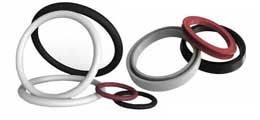
Seals play an important role in many machines. Machines often have fluid- or gas passages. As the fluid or gas heats up, it will become pressurized. To prevent leaks, mechanical seals such as O-rings are placed around the mating surfaces of these passages.
You can find seals in different materials, however. While most seals are made of an elastomeric, the specific type of elastomeric material from which they are made may vary. Nitrile butadiene rubber, for example, is a common material used in the construction of seals. To learn more about nitrile butadiene rubber seals and why they are such a popular choice, keep reading.
What Is Nitrile Butadiene Rubber?
Nitrile butadiene rubber is a synthetic rubber that’s made of two primary monomers: acrylonitrile and butadiene. Some types of nitrile butadiene rubber contain just 18% acrylonitrile, whereas others contain up to 50% acrylonitrile. Regardless, all types of nitrile butadiene rubber contain both acrylonitrile and butadiene.
Also known simply as nitrile rubber or NBR, nitrile butadiene rubber features elastomeric properties. Like with other elastomeric materials, nitrile butadiene rubber will return to its original shape and size after being deformed.
What Are Nitrile Butadiene Rubber Seals?
Nitrile butadiene rubber seals are mechanical seals made of the material of their namesake. They are available in different styles, such as O-rings and gaskets. When placed around a mating surface, nitrile butadiene rubber seals will help to protect against leaks. Pressurized fluid or gas can travel through the mating surface without leaking thanks to the seal’s elastomeric properties.
Advantages of Nitrile Butadiene Rubber Seals
Why should you choose nitrile butadiene rubber seals over other types of mechanical seals? For starters, they offer excellent oil and chemical resistance. Prolonged exposure to oils and chemicals can degrade many other types of seals, eventually jeopardizing the integrity of the mating surfaces where they are installed. Fortunately, nitrile butadiene rubber seals can withstand oils and chemicals without degrading. The more acrylonitrile a butadiene rubber seal has, the better it will resist oils and chemicals.
Nitrile butadiene rubber seals are also resistant to heat and cold. Extreme temperatures may cause other types of seals to fail. Extreme heat can weaken and deform seals to the point where they leak. Extreme cold can make other types of seals brittle and, thus, break. Nitrile butadiene, though, is known for its ability to withstand both heat and cold.
Durability is another advantage of nitrile butadiene rubber seals. Nitrile butadiene rubber is a tough, durable material with excellent resistance to abrasion.
